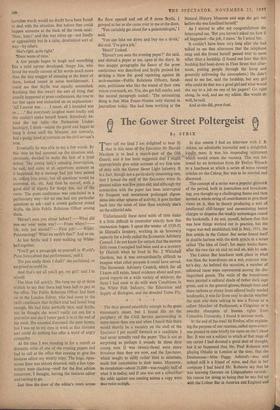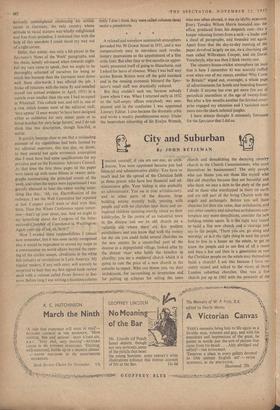The Gower Street Poltergeist
By STRIX THEY tell me (and I am delighted to hear it) that in this issue of the Spectator Sir Harold Nicolson is to lead a march-past of the Old Guard; and it has been suggested that I might appropriately give some account of my first tour of duty with the Gower Street Light Infantry. It is a fact, though not a particularly interesting one, that I joined the staff of the Spectator when its present editor was five years old; and although my connection with the paper has been interrupted by frequent and sometimes prolonged digres- sions into other spheres of activity, it goes farther back into the mists of time than anybody else's on the editorial side.
Unfortunately these same mists of time make it a little difficult to remember exactly how this connection began. I spent the winter of 1930-31 in Disraeli's lavatory, working in an honorary capacity for a body called the Economic Advisory Council. I do not know for certain that the narrow little room I occupied had been used as a lavatory by Disraeli when he lived in No. 2 Whitehall Gardens, but it was extraordinarily difficult to imagine what other purpose it could have served. The Economic Advisory Council, which for all I know still exists, heard evidence about and pre- pared reports on a wide variety of subjects; the three I had most to do with were Conditions in the White Fish Industry, the Education and Supply of Biologists, and the dreaded Tsetse Fly.
The days passed peacefully enough in the great statesman's closet, but I found life on the periphery of the Civil Service unrewarding in more senses than one and when I heard that there would shortly be a vacancy on the staff of the Spectator I put myself forward as a candidate. I had never actually read' the paper. This is not as surprising as perhaps it sounds. In those days young men (I was twenty-three) were more frivolous than they are now, and the Spectator, which sought to edify rather than to entertain, made few concessions to their tastes. Moreover, its circulation—about 21,000—was roughly half of what it is today, and if one was not a subscriber the odds against one coming across a copy were thus twice as high. In due course I had an interview with J. B. Atkins, an admirable journalist and a delightful, kindly man; it was his impending retirement, which would create the vacancy. This was fol- lowed by an invitation from Sir Evelyn Wrench to a luncheon at which a series of some twenty articles on the Colour. Bar was to be mooted and discussed.
The concept of a series was a popular gimmick of the period, both in journalism and broadcast- ing; you thought up a challenging theme and then invited a whole string of contributors to give their views on it, thus in theory producing a sort of intellectual cliff-hanger and necessitating baton charges to disperse the weekly scrimmages round the bookstalls. I do not, myself, believe that this was how things worked out in practice, but the vogue was well established, and in May, 1931, the first article in the Colour Bar series found itself in double harness with the sixth article in a series called 'The Idea of God'; for many weeks there- after the two ran on and on and on, side by side.
The Colour Bar luncheon took place in what was then the boardroom on a wet, overcast win- ter's day. As befitted the occasion, a number of coloured races were represented among the dis- tinguished guests. The walls of the boardroom were painted a cultural shade of rather dark sage green, and in the general gloom, though here and there turbans or ebony faces offered badly needed landmarks, it was far from easy to decide whether the man you were talking to was a Parsee or a sallow Member of Parliament, a Cingalcse or a swarthy champion of human rights from Columbia University. I found it anxious work.
At the end of the meal Sir Evelyn, after explain- ing the purpose of our reunion, called upon every- one present to state briefly his views on the Colour Bar. It was not a subject to which at that stage of my career I had devoted a great deal of thought, but it so happened that Mr. Paul Robeson was playing Othello in London at the time, that the Desdemona—Miss Peggy Ashcroft—was and indeed still is a friend of mine, and that in her company I had heard Mr. Robeson say that he was learning German on Linguaphone records: his reason for doing so being that he was fed up with the Colour Bar in America and England and
seriously contemplated continuing his artistic career in Germany, the only country whose attitude to racial matters was wholly enlightened and free from prejudice. I reckoned that with the help of this anecdote I could shoot my way out of a tight corner.
Hitler, that winter, was only a bit-player in the Spectator's 'News of the Week' paragraphs, and the thesis, lamely advanced when towards night- fall my turn came to speak, that we ought to be thoroughly ashamed of ourselves for being so much less humane than the Germans went down well. Soon afterwards I was offered the job. I broke off relations with the tsetse fly and installed myself (on textual evidence in April, 1931) in a cubicle even smaller than the one I had occupied in Whitehall. This cubicle was, and still is, one of a row which houses most of the editorial staff; 'they appear' (1 once wrote) `to have been designed either as oubliettes for very minor poets or as ferret-hutches for very large ferrets.' and I do not think that this description, though fanciful, is unfair.
It quickly became clear to me that a misleading estimate of my capabilities had been formed by my editorial superiors; this was due, no doubt, to their natural but quite erroneous assumption that I must have had some qualifications for my previous post on the Economic Advisory Council. At that time the first three pages of the paper were taken up with some fifteen or twenty para- graphs summarising the principal events of the week, and when the topics were apportioned I was gravely alarmed to hear the editor saying some- thing like this : `Ah, yes. Electrification of the railways; I see the Weir Committee has reported at last. I expect you'll want to deal with that, Strix. Then this Wheat Conference opens tomor- row—that's up your street, too. And we ought to say something about the Congress of the Inter- national Chamber, of Commerce in Washington. Again your cup of tea, eh, Strix?'
How I evaded these responsibilities I cannot now remember, but it was soon tacitly recognised that it would be imprudent to extend my scope as a commentator on world affairs beyond the open- ing of the cricket season, conditions in the white fish industry or revolutions in Latin America. My regular readers, if any such exist, will scarcely be surprised to hear that my first signed book review dealt with a volume called From Surtees to Seri- soon. Before long I was writing a facetious column
(only I don't think they were called columns then) under a pseudonym.
A relaxed and somehow amateurish atmosphere pervaded No. 99 Gower Street in 1931, and it was comparatively easy to introduce such revolu- tionary innovations as the appointment of a film critic (me). But after four or five months an oppor- tunity presented itself of going to Manchuria, and 1 asked for leave of absence, When I was half way across Russia Britain went off the gold standard and in the ensuing economic blizzard the Spec- tator's small staff was drastically reduced.
But they couldn't sack me, because nobody knew where I was. When I returned early in 1932 to the half-empty offices everybody was non- plussed and in the confusion I was appointed Literary Editor. I also became the dramatic critic and wrote a weekly pseudonymous essay. Under the benevolent editorship of Sir Evelyn Wrench, who was often abroad, it was an idyllic existence. Every Tuesday Wilson Harris bounded into the office, produced from his despatch case—like a keeper releasing ferrets from a sack—a leader and a sheaf of paragraphs, and bounded out again. Apart from that the day-to-day running of the paper devolved largely on me, on a charming old man called Wilbraham Cooper, and on Derek Verschoyle, who was then I think twenty-one.
The country-house-cricket atmosphere (at least that is how I remember it) was scarcely ruffled even when one of my essays, entitled 'Why Come to Britain?' wiped out, overnight, a whole page of advertisements for hotels and boarding houses. I doubt if anyone has ever got more fun out of periodical journalism at the age of twenty-four. But after a few months another far-fetched enter- prise engaged my attention and I vanished once more into the shark-infested jungles.
1 have always thought it extremely fortunate for the Spectator that I did so.











































































 Previous page
Previous page